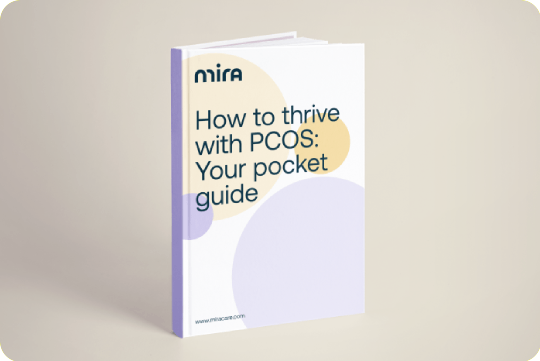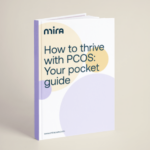10 PCOS Fertility Diet Tips to Increase Your Chances of Pregnancy
Polycystic ovarian syndrome (PCOS) is a common hormonal condition that significantly impacts your fertility. Surprisingly, many women don’t even know they have it, as PCOS is a master of disguise. The symptoms can be non-specific, meaning they might be confused with other conditions.

If you think you may have PCOS (or already know that you have it) and want to get pregnant, you’re probably willing to try anything in order to conceive successfully. After all, getting pregnant can be much more difficult when you have PCOS.
You especially might be wondering if changing your diet can increase your chances of pregnancy with PCOS. While diet alone won’t get you pregnant, following these ten rules — inspired by the Fertility Diet — can help you conceive successfully, even if you have PCOS (check out our 12 favorite fertility recipes here).
What is PCOS?
Polycystic ovarian syndrome (PCOS) is a condition caused by a hormonal imbalance. It impacts four types of hormones found in the female body: androgens, estrogen, progesterone, and insulin. This can lead to a variety of symptoms, including irregular periods, ovarian cysts, facial hair, weight gain, and cystic acne. PCOS can also cause infertility by interfering with ovulation. PCOS is extremely common, affecting 1 in 10 women. To learn more about PCOS, check out our blog post, PCOS 101.
PCOS and Fertility
Approximately 90% of infertility cases due to anovulation are caused by PCOS. While there is no universal cure for infertility caused by PCOS, some women can balance their hormones naturally, through diet and other lifestyle changes.
Nutrition is the first thing to consider when trying to balance your hormones for optimal fertility, as diet plays a critical role in regulating hormone balance. PCOS affects levels of the hormone testosterone, which causes insulin levels to rise. This can lead to insulin resistance and weight gain, especially if we eat a diet high in carbohydrates. Chronic, low-grade inflammation is also closely associated with PCOS — and adding pro-inflammatory foods, such as trans fats or simple sugars, does not help.
Basic Rules of the PCOS Fertility Diet
Making changes to your diet can reverse many of the symptoms caused by high insulin levels and chronic, low-grade inflammation, such as weight gain, fatigue, bloating, and even anxiety and depression. In the next section, we’ll break down ten rules to follow when eating for PCOS to manage your symptoms and optimize your fertility.
1. Choose Whole Foods Over Processed Ones
Unlike fad diets such as Weight Watchers and Atkins, a whole-food, plant-based diet is more of a lifestyle change than anything else. Instead of asking you to cut out animal products or processed foods, it simply asks you to cut back. Focus on eating mainly plants (such as fruits, vegetables, legumes, seeds, nuts, and whole grains) and limit animal products like meat and dairy.
Cooking meals at home can help you stick to this lifestyle while minimizing the amount of added sugar, fat, and salt you’re consuming. Meanwhile, you can still treat yourself to the occasional bowl of ice cream or plate of french fries, as long as you’re eating whole foods most of the time!
2. Vote For The Right Carbohydrate
Carbohydrates are one of the three most important macronutrients in our diet. When broken down, carbs provide the building blocks for producing ATP — which, as you might remember from your high school biology class, is the basic energy unit used by all of the cells in your body. You need plenty of carbohydrates for a healthy central nervous system and working muscles. However, it’s important to remember that not all carbs are created equal.
Refined carbohydrates, found in white bread, pasta, and rice, are digested quickly, meaning they will not keep you full for long. The germ of the grain is removed during the processing of white carbs, which significantly lowers their nutritional content and removes the fiber from the grain. Whenever possible, you should vote “yes” on whole grains, such as brown rice, quinoa, millet, and whole wheat.
Because these grains are not processed, they still contain the germ of the grain, where all the nutrients are stored. They are also higher in fiber, which helps you stay full longer without the need for constant snacking.
3. Include Healthy Fats
Science has gone back-and-forth on whether fat is good or bad for you. Based on the latest research, the answer does not appear quite so black-and-white. Rather, there are “good” types of fat and “bad” types of fat that play different roles in your body. Whenever possible, you should substitute “good” fats for “bad” fats, rather than replacing fatty foods with refined carbohydrates or other unhealthy options.
Trans fats, which are man-made by changing the chemical bonds found in the fat, are “bad” and should be avoided at all costs. These fats are pro-inflammatory foods and can significantly raise your cholesterol and triglycerides. Trans fats can be found in hydrogenated oils, which are added to things like processed peanut butter and fried fast foods.
Saturated fats, found in foods like butter and coconut oil, are not as good for you as unsaturated fats, but you still need a small amount of them in your diet. Most of the time, however, you should choose “good” fats, a.k.a. unsaturated fats. These healthy fats are found in olive oil, canola oil, avocado, nuts, and fatty fish, among other foods. Unsaturated fats like these can lower your cholesterol and reduce your risk of heart disease. They also help you stay full and regulate your blood sugar, which is important for women with PCOS.
4. Cut Back on Added Sugar
The sugar we eat in foods is either added or natural. Natural sugars, like fructose and lactose, are found in fruits and dairy products. Meanwhile, added sugar, or sucrose, does not occur naturally in food but is added by manufacturers.
Sucrose tastes good — which is why it’s added to almost everything! From pasta sauce to yogurt, most processed foods sold at the grocery store contain some amount of added sugar. Low-fat and fat-free foods are especially loaded with added sugar, as the sugar improves the taste lost by removing the fat from these foods.
Because insulin is the hormone that helps us process sugar, eating too much added sugar can lead to insulin resistance and weight gain in women with PCOS. Over time, eating high amounts of added sugar may also raise our risk of developing diabetes, high blood pressure, or heart disease. Even if you do not think you are eating lots of added sugar, it’s important to start reading labels and paying attention to what goes into the food you eat every day, especially if you have PCOS.
Make sure you are familiar with all 61 names for sugar that can be found on a nutrition label, as manufacturers often try to hide added sugar in foods by hoping you won’t notice it!
5. Add Delicious, Anti-Inflammatory Foods
Calming the chronic, low-grade inflammation caused by hormone imbalance soothes symptoms of PCOS and may help you get pregnant more easily. As we mentioned earlier, diet plays an especially crucial role in regulating inflammation in the body. Choosing the wrong foods can worsen low-grade inflammation while eating the right ones can actually fight it!
That doesn’t mean you need to completely cut out your favorite sweets and salty treats, but you should try to minimize the amount of processed food you consume and maximize the number of whole, plant-based foods in your diet.
Many of the most inflammatory foods are ones we have already discussed: trans fats, refined carbohydrates, added sugars, and animal products (especially margarine and red meat) can promote inflammation. Instead, replace these foods with anti-inflammatory choices whenever possible.
Some anti-inflammatory options include tomatoes, olive oil, leafy greens, almonds, walnuts, fatty fish, berries, and citrus fruits. These whole foods are rich in antioxidants, which fight inflammation-causing free radicals in the body, as well as micronutrients like vitamins and minerals that your body needs to operate at its best.
6. Choose Lean Protein
Whether you choose to eat animal products or not, you should always try to choose lean protein which is lower in fat than other types of protein. Lean proteins are a better choice because they help us build muscle and keep us full longer, which helps blood sugar stay in check.
If you eat meat, skinless poultry (like chicken or turkey), lean beef, lean pork, and fish are healthier options than regular beef, pork, bacon, or processed meats (such as hot dogs or lunch meat). However, most vegetarian sources of protein are also considered lean. Even if you aren’t vegetarian or vegan, you may want to try animal-free sources of protein such as tofu, egg whites, and plain Greek yogurt to mix things up and minimize inflammation in your diet.
7. Get Your Probiotics From Fermented Foods
Some bacteria cause illness, but many others live inside our bodies every day as healthy, happy helpers. These beneficial bacteria reside in our gut and improve our digestion, mood, weight, and more by keeping “bad,” disease-causing strains in check. Consuming more probiotics helps maintain healthy levels of these good bacteria in your body.
Most of the probiotics you need can be gained from eating plenty of fermented foods. Foods become fermented when healthy bacteria, called cultures, are added to them. These cultures feed off the natural sugars in the food and release acids, resulting in the sour taste of many fermented foods. For example, yogurt is made by adding cultures to milk, which feed off the lactose that is naturally found in it. Other fermented foods include kefir, tempeh, miso, kimchi, sauerkraut, and pickles.
If you don’t like these foods, you might try a probiotic supplement instead. Just make sure any probiotic supplement you choose contains at least one billion CFUs (colony-forming units) of live probiotics. Not all probiotics in a single dose can survive the body’s harsh stomach acid. Hence, it’s important to take the proper dosage to ensure you get the most benefit from a probiotic supplement.
8. Be Smart About Coffee and Alcohol
Caffeine and alcohol are two of the most commonly used (and abused) substances in the American diet. As much as you may love your morning cup of coffee or your nightly glass of red wine, you may want to consider limiting or eliminating them for the sake of your fertility. Some studies suggest that any more than a single cup of caffeinated coffee per day may negatively impact your fertility. Heavy drinking has also been associated with ovulatory disorders, a leading cause of female infertility.
When you’re looking to substitute a healthier drink for caffeinated or alcoholic beverages, you might try reaching for a cup of green tea instead. Green tea is loaded with anti-inflammatory antioxidants that may relieve the symptoms of PCOS. Better yet, it may also play a role in preventing diabetes, cancer, and heart disease. Try it with a squeeze of lemon and a dash of honey for a luxurious nighttime treat.
9. Refrain from Dairy and Gluten
The role of dairy and gluten in our diets is controversial, but the evidence suggests that some women may benefit from eliminating these two food groups. In many people, dairy and gluten do not cause inflammation. However, increasing numbers of people are sensitive or intolerant to dairy, gluten, or both.
It’s unclear why these intolerances are becoming more common, but people who are gluten- or dairy-intolerant appear to suffer from an inflammatory response when they consume these foods. Their immune systems perceive them as foreign invaders and begin to attack, leading to digestive discomfort and other unpleasant symptoms.
You might be gluten- or dairy-intolerant if you experience digestive upset, brain fog, fatigue, or other symptoms shortly after consuming these foods. If you have a true intolerance to these foods, avoiding them should alleviate the symptoms. You can determine if this is the case for you by keeping a food diary for a week or two, where you note what you ate and how you felt afterward.
Thankfully, with the increasing prevalence of gluten- and dairy-intolerance, there are more options than ever before for people looking to avoid gluten or dairy. For example, you might try milk made from almonds, soy, cashews, or oats in your coffee, or swap regular flour for almond, coconut, tapioca, or oat flour when baking.
10. Pick the Right Fruits and Vegetables
We already know that fruits and vegetables are good for you — but they all play a different role in the body in terms of the nutrients they contain and how we digest them. One thing you may especially want to pay attention to if you suffer from PCOS is the glycemic index of the fruits and vegetables you choose. This term describes how food affects your blood sugar: high-glycemic foods raise your blood sugar much more than low-glycemic ones. Because PCOS is linked to insulin resistance, choosing low-glycemic produce over high-glycemic produce may help you maintain a healthy weight and control your blood sugar.
If you have PCOS, you may want to limit your consumption of starchy fruits and vegetables like potatoes (sweet and regular), butternut squash, corn, and green peas. You might also want to eat fewer beans and legumes, such as lentils or split peas. These foods can have a dramatic effect on blood sugar. Meanwhile, make sure you eat plenty of low-glycemic fruits and veggies, such as lettuce, broccoli, cucumbers, tomatoes, and green beans. That way, you’ll get all the benefits of eating fresh produce, without negatively impacting your blood sugar.
Mira’s Editorial Process
All content produced by Mira meets stringent editorial standards, ensuring excellence and accuracy in language and medical precision. Every piece undergoes thorough fact-checking and review by qualified professionals. Check out our full editorial process to learn more.










